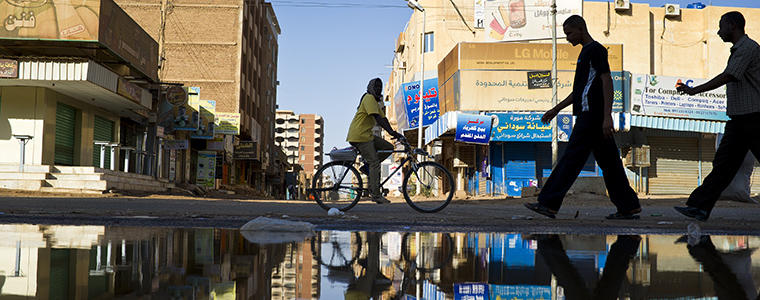USIP's Sudan program director, Jon Temin, discusses the recent oil deal between Sudan and South Sudan.

Sudan and South Sudan reached a deal recently over the fees South Sudan would pay to Sudan to move oil from the oil-rich South through Sudan to northern ports.
The agreement ends a contentious period in which both sides appeared to be far apart from each other about how to pay the fees, with South Sudan wanting to pay as little as $1 per barrel, and Sudan demanding as much as $36 per barrel. In January, South Sudan had shut down oil production, throwing the economies of both countries into peril and raising fears that the violence along the shared border could expand.
But after a visit from Secretary of State Hillary Clinton, the two emerged with a deal to get oil flowing again. USIP's Jon Temin answers a few questions about what transpired.
A crisis seems to have been averted after the two Sudans reached a deal on oil pipeline transit fees. What's the significance of this?
It's an important achievement in negotiations that have been ongoing for about two years. Oil is the lifeblood of both economies, and each is suffering tremendously since South Sudan shut down its oil production. But this is only one piece in a larger puzzle of negotiations following the secession of South Sudan. There remain a host of unresolved issues – many of which relate to oil – such as the location of the border between the two countries, the status of the disputed Abyei territory and accusations that each country supports rebel movements operating in the other's territory.
What role did the AU's Thabo Mbeki play in mediating a deal between the two countries over pipeline fees?
The African Union High-Level Implementation Panel, chaired by President Mbeki, has been at the heart of the negotiations since they began. The panel is an innovative creation by the AU, and the oil agreement is its most important achievement to date. The panel operates in a difficult and sensitive environment, and at various stages has had strained relations with Juba and Khartoum, but deserves credit for its persistence and for sealing this deal.
Is there a possibility that this new agreement comes apart? Are you optimistic?
History shows that any agreement in Sudan is subject to renegotiation and partial implementation. Given the remaining unresolved issues on the table, it is quite possible that this agreement will also go unimplemented if progress is not made on other issues. Sudan has already said that the oil agreement is subject to agreement on security issues. It's important that mechanisms are put in place to monitor implementation of the agreement, and that processes are established to resolve implementation disputes, which will inevitably arise.
If this new agreement between the two countries holds, could it be a sign of cooperation on other fronts?
It could, but it is difficult to envision confidence-building between the two counties at this stage given how long they fought and the range and depth of their continuing disagreements. Confidence-building could come later. The next step is for negotiations to resume in a few weeks, after Ramadan, under the auspices of the AU panel. At that point they will take up the other unresolved issues. One indicator of cooperation to watch for is whether there is tangible progress by then in restarting oil production – some estimates are that it will take several months to get the oil flowing again, and several months more for oil revenue to begin to accrue.